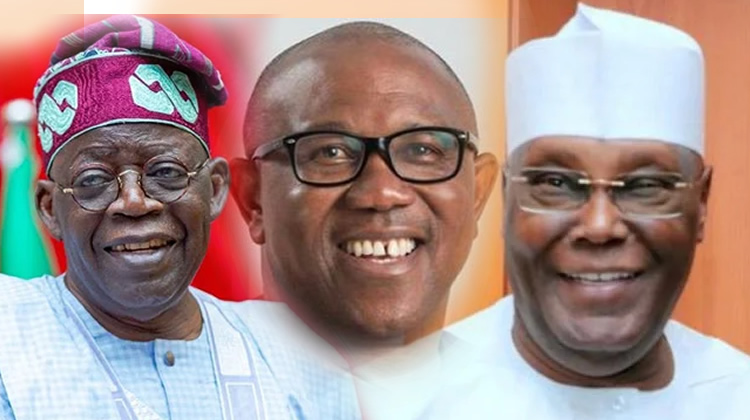In her readable – almost pleasurable – book titled “Leadership: In Turbulent Times,” Doris Kearns Goodwins enumerated four American presidents adjudged to be the most transformational. Although the author didn’t directly address it, I found something common among the presidents – other than their transformational qualities.
Interestingly, two of the four presidential front-runners in Nigeria’s 2023 election share this qualification.
Goodwins did a detailed biography of Abraham Lincoln, Franklin Delano Roosevelt (FDR), Theodore Roosevelt and Lyndon Johnson. She compared and contrasted the four and extracted the secrets to their effectiveness.
It can’t be their background, she argues, because they shared dissimilar upbringings. While Theodore Roosevelt‘s grandfather gave him a comfortable trust fund, Abraham Lincoln grew up in a doorless, floorless and bedless cabin. Also, while Theodore’s father had a huge library and spent liberally on his son’s education, Lincoln’s father removed him from school when he was nine to concentrate on farm work. Whenever Lincoln was caught reading, his father would beat him and destroy his books.
The presidents in reference also had different personal characteristics. Lincoln, for example, was strong and can carry the load of three men while Theodore Roosevelt was often sickly. The other Roosevelt, Franklin, developed polio at age 39 but Lincoln was never sick according to his friends. Also, while Franklin had a sunny disposition, Lincoln was often gloomy. Furthermore, Lincoln developed his remarkable memory by copying out passages multiple times; Theodore’s photographic memory came naturally to him. He could read a page and remember it for life.
Doris Goodwin argued that the things that unite transformational leaders are ambition, having a great purpose, using crises as opportunities and leveraging the strengths of their teams.
However, another common thread I noticed among them is legislative experience. All four of Goodwin’s presidents were lawmakers before they became presidents. Among the four presidential contenders in Nigeria, only two of them share this: Bola Ahmed Tinubu and Rabiu Musa Kwankwaso. Both have been senators. Besides their legislative experience, both have also been governors. The other two contenders, Peter Gregory Obi and Atiku Abubakar don’t have any legislative experience.
But if we’re going to use this as the only yardstick in measuring the candidates, then Bola Tinubu has gone a step deeper than Rabiu Kwankwaso. How?
To answer that question, we go to another American leader: Barack Obama.
A case can be made that Barack Obama was a transformational president in his own way. He himself has legislative experience. Instructively, however, he picked Joe Biden as his vice president – another experienced legislator. Joe Biden himself chose another senator, Kamala Harris, as a running mate and broke a record by receiving the most votes ever cast for a presidential candidate in U.S. history – 81 million votes.
President Biden has continued to break records as shown by the 2022 midterm elections.
Therefore, the fact that Asiwaju Tinubu has chosen another competent legislator, Senator Kashim Shettima, as his running mate, qualifies him more than any candidate in our presidential election. Again, that’s only if we’re using the aforementioned framework as our gauge.
And I think we should because returning four presidents (from 45) with legislative experience as the most transformational (after a rigorous analysis such as Goodwin’s) can not be a coincidence. (Note that she left out some notable heavyweights such as Thomas Jefferson who signed the Declaration of Independence.)
Goodwin actually pointed out the leaders’ legislative acumen a number of times. For example, one of Lyndon Johnson’s “strengths was his mastery of clever procedural tactics” which he used to support Civil Rights.
Further, I concede that a case could be made against the selection of these four. Lyndon Johnson, for example, had a presidency overshadowed by the Vietnam War. At one point, engaging up to 500,000 American soldiers in what appeared to be an unwinnable war. A move that – sometimes – dwarfs his great accomplishments such as the Civil Rights.
Three other books I read since Goodwin’s also highlight the dark side of these presidents. In “White Trash,” a book by Nancy Isenberg, Theodore Roosevelt was described as a eugenicist who believed that the human breed could be improved upon by some calculated sexual reproduction. This eugenics movement influenced policies in America to the extent that at a point, 27 states legalized the sterilization of some “defective” people.
In “The People’s History of the United States,” the author, Howard Zinn, argued that Abraham Lincoln’s struggle to free slaves was more a selfish assignment than for the benefit of the slaves. It’s the reason why former slave owners were compensated after the war. For example, President Andrew Jackson who came after Lincoln gave land to former slave owners but none to the former slaves. John Lewis Gaddis agrees with this argument – to some extent. In “On Grand Strategy,” he contends that aspects of Lincoln’s presidency were oiled by lies and deceit – he told different groups what they wanted to hear.
Ultimately, the rationale for choosing these presidents lies with the author, Doris Goodwin – a responsibility she fulfils to great international acclaim. She has given us a roadmap, Jim Collins, the bestselling author of “Good to Great,” said, of “how good leaders become great leaders.”
My task was to highlight a silent salient insight to analyze four of our presidential candidates.




